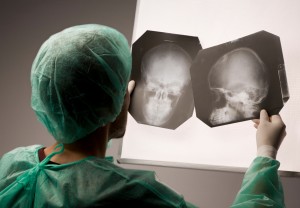Albuquerque Traumatic Brain Injury Lawyer Answers Your Questions

A traumatic brain injury is sometimes referred to as an “invisible” injury. By all outward appearances the patient may seem fine; early on, the patient himself may not even realize he is injured. Over time, however, a brain injury reveals itself in subtle and not-so-subtle ways.
At Khayoumi Law Firm, we have found that the more our clients know about TBI, the better equipped they are to handle its consequences. Here, our Albuquerque traumatic brain injury lawyer, Salim Khayoumi, answers common questions about TBI. If you have additional questions or would like more information, please reach out to us. We will be happy to talk with you.
What is TBI?
Traumatic brain injury (“TBI”) is an injury to the soft tissue of the brain which causes organic damage, resulting in physical, intellectual, emotional, social and/or vocational impairments. The injury may be classified as mild, moderate or severe.
What causes TBI?
TBI is a catch-all term that can mean many things. For purposes of a personal injury case, it refers to an injury to the soft tissue of the brain that is secondary to trauma. That trauma may result from a blow to the head or a fall (i.e., a blunt trauma), blast waves, an electric shock, a lack of oxygen or other events. TBI is commonly associated with whiplash injuries sustained in a rear-end collision. The sudden whip-like motion of the head and neck can cause the soft tissue of the brain to slam against the hard interior of the skull, resulting in injury. A person does not need to hit his head or lose consciousness to suffer a TBI (consider, e.g., Shaken Baby Syndrome).
What are common signs of TBI?
The markers of TBI will vary from individual to individual. Common signs of TBI include:
- Physical Signs: Headaches; sensitivity to light and sound; dizziness; nausea; fatigue; and difficulty sleeping.
- Cognitive Impairment: Difficulty concentrating; difficulty reasoning and thinking; difficulty remembering; memory lapses/amnesia.
- Emotional Signs: Depression; anxiety; mood swings; panic attacks; and irritability.
My injury is real. Why am I being accused of faking it?
The most common defense to a TBI claim is that the injured party is “malingering” – intentionally faking his injury or exaggerating the severity of his injury for personal gain (a big settlement) and to avoid work. Insurance companies, and many jurors, tend to be highly skeptical of all soft-tissue injuries, even TBI. The skepticism toward TBI stems from a number of factors, including:
- Delayed reporting. Delayed onset of symptoms is fairly common, especially in cases of mild TBI. A person may appear to be just fine and refuse medical treatment at the scene of the accident, only to be debilitated by headaches, dizziness and other TBI symptoms several days later.
- Delayed diagnosis. Doctors often do not ask the right questions or enough questions to accurately diagnose TBI. For example, the emergency room physician might ask a patient if he thinks he lost consciousness in the accident, but fail to follow up and ask the patient about his first memory after the accident. (Many TBI patients will report that they did not lose consciousness, but upon further inquiry may not remember anything until they were outside of the vehicle or perhaps in an EMS unit.) Similarly, the emergency room doctor may order a CT scan to rule out a bleed on the brain, and if that comes back negative, dismiss the possibility of TBI altogether.
- Lack of objective evidence. Standard imaging tests (CT, MRI, EEG) are inadequate and often will reveal no abnormality.
- Subjective complaints are hard to assess. The symptoms associated with TBI – headache pain, cognitive difficulties, memory deficits – are subjective and difficult, if not impossible, to quantify with objective medical tests.
How can an Albuquerque traumatic brain injury lawyer help me?
We can help you gather the evidence you need to prove the nature and extent of your brain injury and make your “invisible” injury real to the insurer (and, if necessary, to a jury). Depending on the facts of your case, we can:
- Make sure your condition is accurately diagnosed and that your treatment, recovery and prognosis are plainly documented;
- Gather documents – including your medical, employment, and education records – to support your claim;
- Retain experts, including medical experts (e.g., a neuropsychologist) to explain TBI and counter the DME’s claims, and other experts (e.g., an economist, vocational rehabilitation specialist, and/or life care planner) to support your claim for damages;
- Assemble witnesses who can testify to their observations of you before and after your injury;
- Aggressively challenge a defense claim of malingering by demonstrating the lack of any scientific basis for the claim;
- Put together a persuasive settlement package and negotiate with the insurance company on your behalf; and
- If negotiations should break down, file a lawsuit and fight for your right to compensation in court.
Contact Us
Having a traumatic brain injury attorney in Albuquerque on your side can make all the difference in convincing a skeptical insurance adjuster or jury of the severity of your injury. At Khayoumi Law Firm, our experienced brain injury attorneys know the type of evidence the insurance company wants to see, and we will not allow you to be maligned as a malingerer. Let us get to work for you. Complete the email form on this page or call us, at 505-333-8613, to schedule a free initial consultation.



